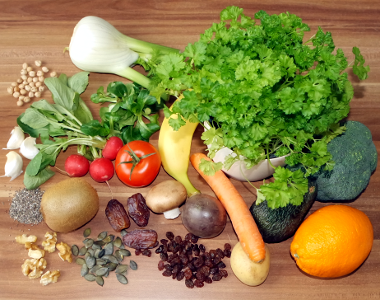Vegan Potassium Foods - Potassium-Rich Diet

Potassium is an essential mineral that must be obtained through diet. Its key functions include nerve impulse transmission and water balance regulation. Additionally, potassium is of greater importance to athletes as it contributes to protein synthesis and is necessary for muscle contractions 1 2.
To prevent potassium deficiency, it is important to pay attention to your daily potassium intake. Since plant-based foods are excellent sources of potassium, it is easy to meet your daily potassium needs with a vegan diet.
Potassium in the corresponding foods is present together with phosphate, sulfate, nitrate, and many organic anions and proteins 3. Approximately 85% of the potassium consumed with food is absorbed by the body 4.
To access the table of potassium-rich foods, click here.
We have compiled a list of some potassium-rich foods that should be regularly consumed as part of a healthy and mineral-rich diet. These are plant-based or vegan foods high in potassium.
Potassium is water-soluble
It is important to note that potassium is water-soluble and can transfer into the water during soaking and cooking of the food. To prevent its loss, the water can be preserved and used for other purposes, such as the base for sauces or soups. Additionally, processing whole foods into convenience meals can affect their potassium content. These products often contain less potassium but higher amounts of sodium. Maintaining a good balance of sodium and potassium is important for heart health 5. Therefore, it is advisable to consume a variety of potassium-rich foods as fresh as possible.
Potassium-Rich Fruits
Fruits, along with vegetables, are the best sources of potassium. Here, avocados (485 mg), bananas (358 mg), passion fruit (348 mg), kiwis (312 mg), rhubarb (288 mg), cantaloupe melon (267 mg), apricots (259 mg), honeydew melons (228 mg), cherries (222 mg), grapes (191 mg), peaches (190 mg), oranges (181 mg), mangoes (168 mg), mandarins (166 mg), plums (157 mg), and strawberries (153 mg) stand out with very high potassium content. Additionally, berries such as gooseberries (198 mg), blackberries (162 mg), raspberries (151 mg), as well as black currants (322 mg) and red currants (275 mg), are excellent sources of potassium.
Dried fruits also contain high amounts of potassium. The potassium content is high in dried apricots (1.85 g), raisins (749 mg), coconut meat (543 mg), dates (730 mg), and figs (680 mg).
Click here for the table of potassium-rich fruits.
Potassium-Rich Vegetables
As mentioned earlier, vegetables are also among the best sources of potassium. Dark leafy greens, in particular, are rich in potassium. Spinach (558 mg), purslane (494 mg), kale (491 mg), lamb's lettuce (459 mg), and Brussels sprouts (389 mg) are the top sources.
However, Jerusalem artichokes (429 mg), potatoes (425 mg), fennel bulbs (414 mg), Swiss chard (379 mg), parsnips (375 mg), kohlrabi (350 mg), pumpkin (340 mg), beets (325 mg), carrots (320 mg), broccoli (316 mg), celeriac (300 mg), cauliflower (299 mg), zucchini (261 mg), tomatoes (237 mg), radishes (233 mg), eggplants (229 mg), bell peppers (211 mg), and asparagus (202 mg) also contain higher amounts of potassium. The latter should ideally be consumed with their skin intact as it contains a significant amount of potassium.
The potassium contained in potatoes can be easily absorbed by the body. 6.
Additional potassium-rich vegetables can be found in the table.
Potassium in Herbs and Spices
In this group as well, the dark green herbs are particularly rich in potassium. Dill (738 mg), thyme (609 mg), parsley (554 mg), garlic (401 mg), chives (296 mg), and basil (295 mg) are excellent sources. Ground turmeric (2.08 g) and ginger powder (1.32 g), in addition to their healthy secondary plant compounds, are also high in potassium.
Nuts and Seeds as Potassium-Rich Foods
Hemp Seeds (1.2 g), pistachios (1.03 g), flaxseeds (813 mg), pumpkin seeds (809 mg), almonds (733 mg), hazelnuts (680 mg), cashews (660 mg), Brazil nuts (659 mg), sunflower seeds (645 mg), walnuts (441 mg), and chia seeds (407 mg) are potassium-rich foods, and at least one of them should be included in the daily diet due to their fatty acids.
For more nuts and seeds with potassium, refer to the table here.
Legumes with Potassium
White beans (1.8 g), kidney beans (1.41 g), chickpeas (718 mg), green beans (211 mg), and lentils (677 mg) contain significant amounts of potassium. Consuming peanuts (705 mg) also contributes to meeting the daily potassium requirement. Use this table showing other legumes and their potassium content.
Potassium-Rich Grains
Rye (510 mg), oats (429 mg), spelt (388 mg), and corn (287 mg) are among the leaders. Quinoa (563 mg), amaranth (508 mg), and buckwheat (460 mg) also provide a significant amount of potassium as pseudo-grains.
Additionally, sprouted grains like wheat sprouts (892 mg) are also rich in potassium.
Which wide grain varieties and grain products contain potassium is stated in the table.
Potassium in Mushrooms
Oyster mushrooms (402 mg), champignon mushrooms (318 mg), and shiitake mushrooms (304 mg) are good sources of potassium and should be regularly consumed, especially in winter, due to their vitamin D content. Here is the potassium table with the levels in mushrooms.
Potassium in Processed Products
Rice bran ranks first in this group by far. This high-fiber food contains a very high amount of potassium at 1.49 g. Falafel (585 mg), bulgur (410 mg), and couscous (166 mg) also contain some potassium. Cocoa products such as vegan chocolate, especially dark chocolate, are also suitable as potassium sources.
But above all, the corresponding vegetable and fruit juices for the mentioned foods are rich in potassium. Furthermore, drinks such as plum juice (276 mg), coconut water (250 mg), and orange juice (200 mg) also contain higher amounts of potassium.
 VEGANALYZE
VEGANALYZE